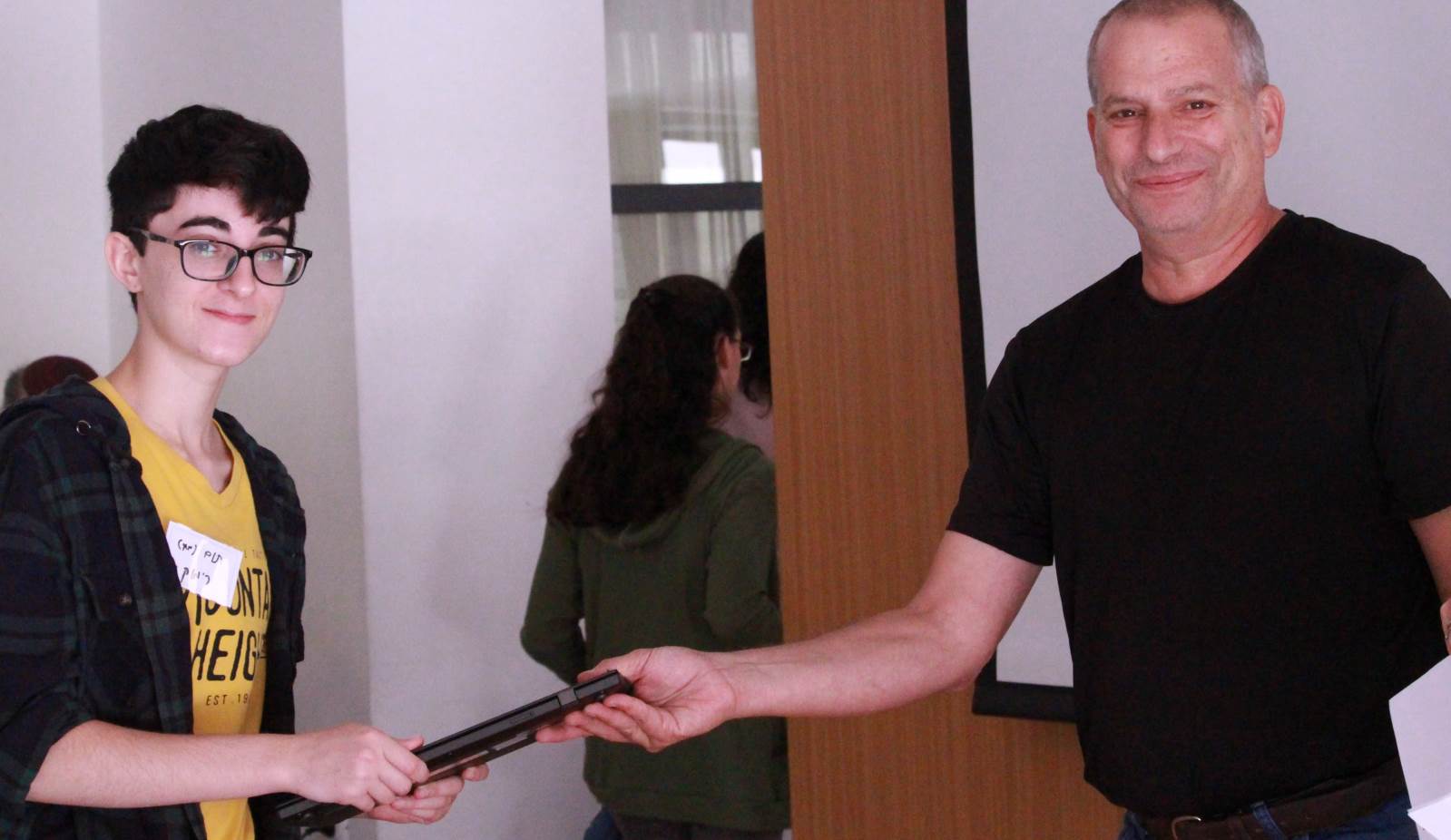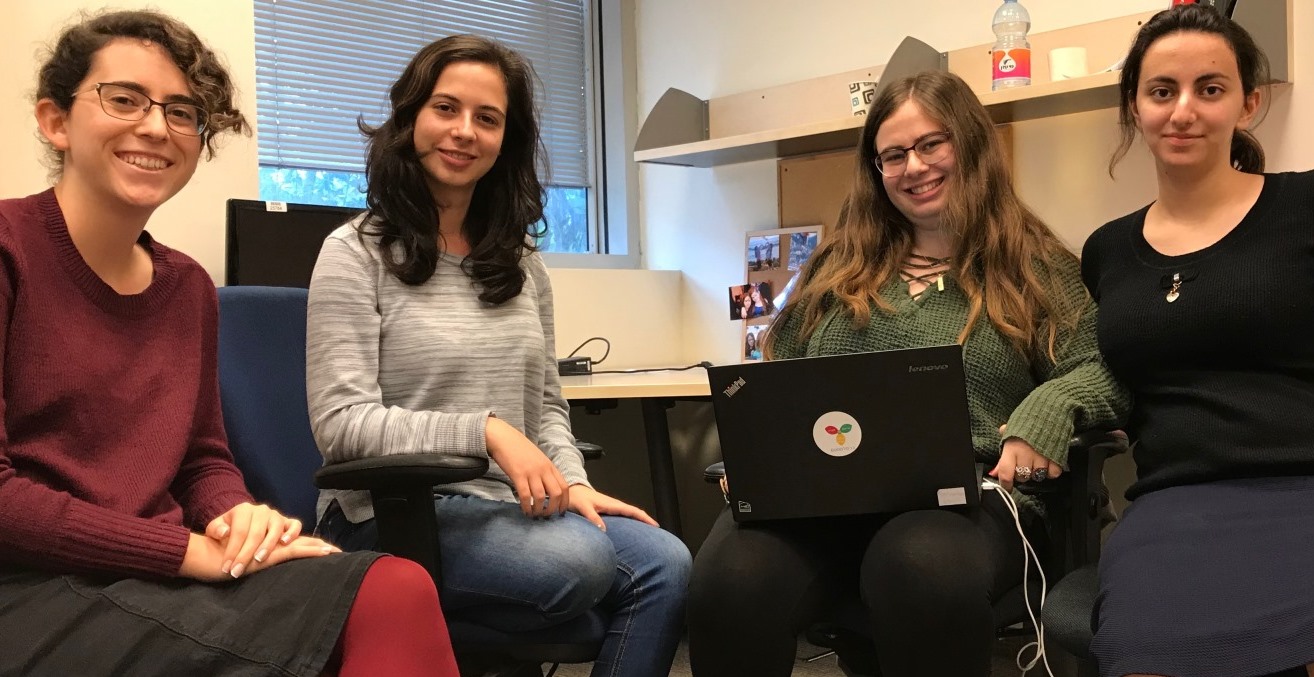If Deborah Wolhandler had enlisted in the Israeli military she may well have been picked for an elite tech squad such as the renowned 8200 signal intelligence unit where many founders of Israel’s most successful businesses cut their teeth.
But like many young Israelis – as many as 50 percent of the target age group — excused from mandatory service for religious, physical or psychological reasons, Wolhandler chose the non-mandatory alternative of National Service (Sherut Leumi).
A new National Service branch, Carmel 6000, gives her the opportunity to make a social impact through technology.
“I always wanted to serve my country in a way that uses my skills,” Wolhander, 22, tells ISRAEL21c.
Her Carmel 6000 team is creating a photo database of Jerusalem landmark or heritage site signs. They will add features enabling anyone, including those with disabilities, to access information about the sites and perhaps link to related tours.
Wolhandler discovered Carmel 6000 online last March, before completing her bachelor’s degree in computer engineering at the Technion-Israel Institute of Technology.
“The idea of Carmel 6000 is to position Israel as a significant player in the social-tech world similar to where we are in cyber.”
Most of the other participants are fresh out of high school, like Tom Rimok, 18. Her team is developing Telebuzz, a smartwatch that transfers spoken messages to text using very high frequencies. “It works offline so it doesn’t matter where you are,” she says.
The idea for Telebuzz came from a Jerusalem school for children with hearing disabilities. All Carmel 6000 projects fill needs articulated by clients, mainly organizations working on behalf of disadvantaged populations.
Another of the 18 current projects is an awareness campaign for Access Israel that has Israeli high school students mapping dining and leisure venues that are accessible to people with physical limitations. The data will be turned over to Google to add to Google Maps.

“The core of National Service is to do something for the welfare of society,” Carmel 6000 cofounder Yossi Tsuria tells ISRAEL21c.
“The idea of Carmel 6000 is to position Israel as a significant player in the social-tech world similar to where we are in cyber. We need to grow a generation of people that can lead this revolution.”
Product expert and ed-tech innovator Michal Ophir heads Carmel 6000’s user experience (UX) department. She asked to join Tsuria’s initiative at the pilot stage, even though there was no budget to pay her yet, because she strongly believed in the concept.
“You can work in high-tech and make a lot of money, but at the end of the day what did you do for the world?” Ophir asks. “Can you say you changed something?”
Foreign volunteers welcome
Tsuria, a high-tech entrepreneur, was a cofounder of Jerusalem-based NDS. When NDS was acquired by Cisco in 2012, Tsuria became executive adviser to Cisco.
Last year, he quit his job to put his experience to use in the social sphere.
Carmel 6000 began in the 2017-18 academic year as a pilot program with two top female graduates of high schools in the AMIT educational network. Among their projects were reverse sensors for electric wheelchairs and a system enabling home treatment for people with cognitive issues.
The Carmel 6000 Development Center is based at the Jerusalem headquarters of Synamedia (formerly Cisco). Volunteer mentors and lecturers come from Synamedia and other nearby firms including Intel, Matrix, L&T and OrCam, as well as from Hebrew University and the Jerusalem College of Technology.
So far, all Carmel 6000 volunteers are women from the national-religious sector with outstanding aptitude in math, physics and English. The first male applicant has been accepted for the two-year program’s next cohort.

Tsuria says successful applicants must be passionate self-starters: “People who become legendary in high-tech are not afraid to try new things.”
A short version of Carmel 6000 is open to overseas youth in cooperation with the Diaspora Affairs Ministry. A group of these volunteers last summer created a device enabling kids with hand mobility limitations to spin a Hanukkah top (dreidel, or sevivon) at Beit Issie Shapira’s holiday party for young clients and their siblings.
Looking ahead, Tsuria plans a Tikun Olam Technology Think Tank (T4), where an international group of creative and technological minds will brainstorm about problems and social-tech solutions that can be made at Carmel 6000.
“In some cases, after market research, we will conclude that there is a global need for some of our solutions. In order to globalize our work, we will need to produce the solution, customize it, provide global support, and so on,” says Tsuria. “Our objectives at that stage will be met by creating startups around the solutions and IP. This will be achieved in our Carmel 6000 Accelerator.”
Recognition from London Stock Exchange
“In the first two years, we intend to produce more than 25 projects, have 60 full-time National Service volunteers, and expose the program to hundreds of young people from the US and other countries who will take active part in the development of ideas, solutions and products,” says Tsuria.
“Longer term, we expect to see a world-leading ecosystem of startups and activities in this domain around the center in Jerusalem.”
Tsuria points out that unlike social-tech hackathons held in Israel, Carmel 6000 can provide ongoing tech support for its inventions.
Clients that already have a working relationship with the program also include Yad Vashem World Holocaust Remembrance Center, ALYN pediatric rehab hospital, ALEH residential network for children with multiple severe disabilities and Alut-the Israeli Society for Children and Adults with Autism.
Avital Bayer, head of international relations for Carmel 6000, recruits private donors for specific projects and organizes delegations from other countries interested in replicating the program.
She’s hosted visitors from Zambia, Australia and London. American Ivy League students and alumni are coming next, eager to learn how to combine technology and philanthropy.
The London Stock Exchange chose Carmel 6000 as its highlighted charitable partner for its recent third annual Capital Markets Conference in Israel.
“In January, the London Stock Exchange is launching the Jewish Women Business Network and they invited to me speak on a panel about what we’re doing here at Carmel 6000,” says Bayer, formerly international liaison at the Israeli Embassy in London’s Trade and Economic Division.
Ready for the job market
After two years at Carmel 6000, alumni will enter the job market as experienced programmers.
“No matter what career I decide on, what I am learning at Carmel 6000 will help me,” Wolhandler says, noting that teamwork, planning and project organization are among the universal skills she’s gaining. She is also taking master’s courses at Hebrew University in natural language processing and computer vision.
Rachel Levenstein, 18, tells ISRAEL21c she enjoys “doing something technological that I benefit from while also helping other people.”
Working in a high-tech park has its perks, too. “You see all these super-smart-looking people with their cool computer backpacks, and then me!” says Levenstein.
She and the other 29 Carmel 6000 participants, culled from a field of 150 applicants, got their own computers – and logo backpacks – after the initial training period.
Israel’s Ministry of Education, Ministry of Diaspora Affairs, Authority for Civil Service, AMIT and the Jerusalem Development Authority support the initiative together with investors including PICO Partners. Within a few years, Tsuria expects to break even by charging for projects and commercializing IP.
The name Carmel 6000 combines a Hebrew acronym for “willpower, brain and heart” with 6000, the Jewish calendar year that Talmudic and Kabbalistic scholars predicted the world as know it would end – either well or badly. The current Jewish year is 5779.
“Our National Service volunteers have the next 221 years to make sure it goes the way we want,” explains Bayer.
For more information, click here














